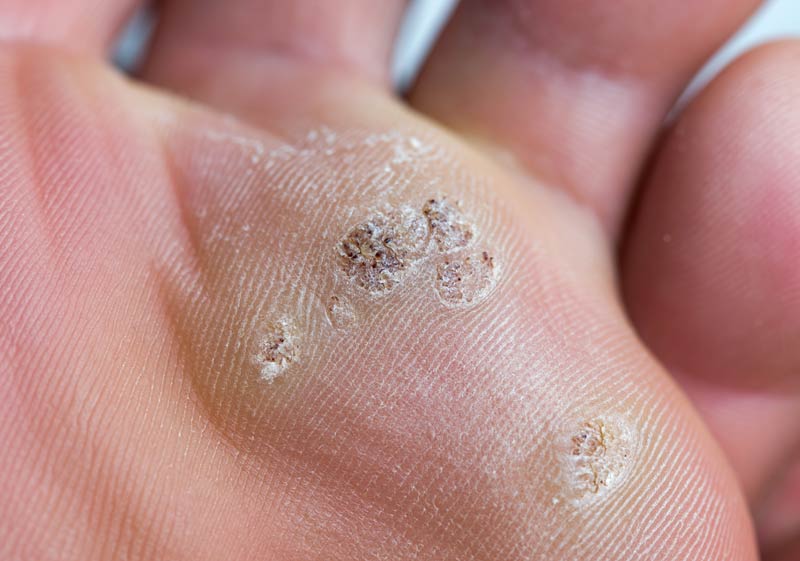Podiatry Treatments
Verrucae Treatment
A verruca is a viral infection of the skin, similar to a wart. Verrucae can be painful and unsightly. At Feet Matters, we offer a variety of treatment options depending on the type of verrucae and the patients desires.

Feet Matters use Swift Microwave Therapy

What is a verruca?
A verruca is a viral infection of the skin, similar to a wart. These can be of varying size and number and can occur anywhere on the foot. They have little black dots which are blood vessels that have been pushed to the surface. At an early stage, the verruca looks just like a blemish on the foot. It can spread quickly into a cluster of lots of tiny verrucae (known as mosaic warts). When you walk and stand, pressure can force the verruca into the skin – flattening it.
What causes them and are they contagious?
The Human Papilloma Virus (HPV) is the cause of verrucae. It is the same virus that causes warts and cold sores and it is contagious. Direct contact can result in the virus passing from person to person. It is thought that the virus thrives in moist, damp environments. Swimming pools, communal shower areas and changing rooms are places where the virus can spread. Like all warts, verrucae are harmless and sometimes go away over time without any treatment at all. However, there are lots of reasons to visit a podiatrist for a verrucae. The natural process can take months or even years. Verrucae do not always cause pain or discomfort, but can often be too painful to ignore. Some patients find them unsightly, especially in cases where the verrucae spread quickly over the foot.
What treatment options are available for verrucae?
The Dartford Foot Clinic offers four different verrucae treatment options:
- Salicylic Acid/ Silver Nitrate:
The verrucae is debrided/ reduced and a pad is applied with a hole over the verruca. The hole is filled with salicylic acid and or silver nitrate which destroys the cells in which the virus is living. The pad needs to be left in place for 3 days and kept dry. This is the most common treatment, is generally painless and usually requires around 3 sessions with home treatment in between. - Freezing/Cryotherapy:
The verruca is debrided/reduced and liquid nitrogen is applied to freeze the cells the virus is living in. This causes the cells to die and the virus dies too. Freezing can require several repeat treatments. - Swift microwave therapy:
This is a new, innovative technique that involves rapidly heating the virus. It is nice to finally have a modern, effective treatment option. The temperature rise causes the virus enzymes to become visible to the body’s defence system. That allows the body to make the required antibodies to destroy the virus.
What can I expect during Swift Therapy?
You will find the Swift treatment process to be relatively quick and straightforward. The special Swift probe applies microwave energy to the skin to treat the affected tissue.
Will I feel any pain?
You might feel a hot or warming sensation towards the end of the 5 second treatment which may be a little uncomfortable for a few seconds. Half of patients do not feel any pain at all. Any pain felt during the treatment immediately stops the moment the probe is removed from the site. An advantage over other verrucae treatments.
What can I do after Swift treatment?
You will be able to resume normal daily activities straight away as there is no ‘wound’ to protect or need to keep it dry.
Will I need more than one treatment?
It usually requires 3 sessions each a month apart. However if after 2 sessions it is gone then a third is not needed.
For more information visit the Swift website.
ELECTROSURGERY
This treatment requires a local anaesthetic. An electrical current is used to vaporise and remove the verrucae.
Electrosurgery if extremely effective to remove a verruca in a single treatment.
However due to the local anaesthetic injection required and the site requiring careful healing post op it is not usually used on children.
All treatments available for verrucae are highly successful. Many things can affect how quickly they go including, type and number of verrucae, how long they have been there and the treatment option taken.
Share:



